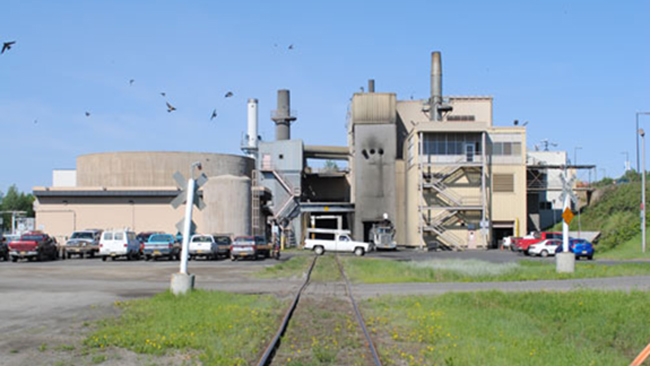
At $245 million, the biggest item in the capital budget before the Legislature is a power plant for the University of Alaska Fairbanks. The plant is needed to replace an old one that’s at risk of breaking down. The project is now before the House Finance Committee for review, and lawmakers are less surprised by the price tag than by how the funding package works in the first place.
Because Alaska is in deficit spending mode, the Legislature is less inclined to sign massive checks outright. So, if you want a megaproject funded, you can ask for a trickle of grants spread out over a few years. Or, you can fund it creatively.
The second approach is being taken with the University of Alaska Fairbanks power plant. And lawmakers like Rep. Lindsey Holmes wrestled with the concept on Tuesday night.
“I’m just trying to get a handle on who’s paying where, and to what extent the moral obligation or actual obligation of the state is involved, and ‘Who’s on first?’” said Holmes. “Since we’ve got for different funding sources kind of all weaving together.”
There’s good reason for being lost.
The first chunk of money is $37.5 million in straight cash, which some senators had originally wanted to use to finish UAF’s engineering building. Then comes a $50 million reappropriation, with the Legislature draining an energy loan program to help pay for the plant. The third pot of money is made of $70 million in revenue bonds, with the University of Alaska slated to pay that back through energy savings and by potentially passing the cost onto students.
Last but not least is the biggest source of money: $87.5 million from the Municipal Bond Bank Authority, which has in the past only sold bonds for Alaska’s cities. That’s probably the most complicated part of the arrangement, because even though the bonds are for the University system, the state will be paying off that debt on their behalf, to the tune of up to $7 million a year.
Even Deven Mitchell, who directs the bond bank, struggled to explain who will actually be responsible for paying that off.
“The state is going to [pay] — maybe, yeah, through the back door — but not from our perspective,” said Mitchell “The commitments that we’re going to get is from the university.”
The patchwork nature of the deal left members of the House Finance Committee with plenty of questions, like: Why wasn’t the state just paying for this upfront, instead of increasing the cost of the project by basically taking on debt?
Rep. Tammie Wilson, a North Pole Republican, wanted to know if UAF students were at risk of shouldering the burden, through either increased tuition or fuel surcharges.
“I guess that’s what I don’t understand,” said Wilson. “To me, maintenance it shouldn’t matter if it’s on UAA, UAF, or UAS, or even one of your smaller campuses. And I don’t know how your books work, so if I understand you correctly, though, University of Alaska Fairbanks would be keeping their own books, UAA would have their own accounting books, and each smaller one. And that’s how everything gets funded instead of your one system that takes care of it as a system.”
UAF Chancellor Brian Rogers responded that deciding whether the whole system or just the Fairbanks campus would cover the costs would be left to the Board of Regents.
Committee members also wanted answers on why the project was so urgent. Rogers explained that unless the University upgrades their coal-powered plant, the campus was at risk of a major failure that would leave all of its buildings without power or heat. It’s their top priority, and Fairbanks Republican Pete Kelly fought hard for the package in the Senate, winning out over the reservations of some of his colleagues.
With all the confusion surrounding the project, Finance Co-Chair Bill Stoltze decided not to advance the package straight away and instead let members – including himself – digest it.
“I’m trying to come up with, really an understanding, because, this is, usually when there’s … Usually folks aren’t speechless,” said Stoltze.
The committee is expected to amend the deal to lower the state’s annual payment in coming days.
